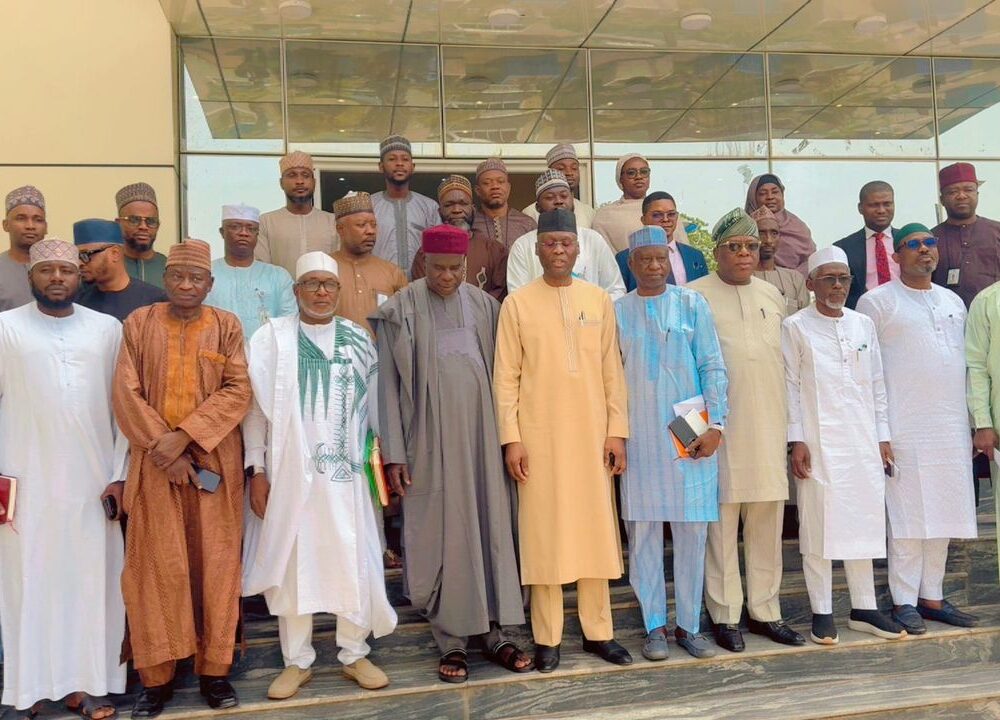In the name of Allah, the Most Gracious and the Bestower of Mercy
All thanks and praise is due to Allah, we seek His help and forgiveness. We seek refuge in Allah from the evil within ourselves and the consequences of our evil deeds.
Whoever Allah guides will never be led astray, and whoever Allah leads astray will never find guidance. I bear witness that there is no god but Allah, He is alone without any partners, and I bear witness that Muhammad is His servant and His Messenger.
“O you who have believed, fear Allah as He should be feared and do not die except as Muslims in submission to Him.” [Quran, 3:102]
“O mankind, fear your Lord, who created you from one soul and created from it its mate and dispersed from both of them many men and women. And fear Allah, through whom you ask one another, and the wombs. Verily, Allah is ever watching over you.” [Quran, 4:1]
“O you who have believed, fear Allah and speak words of appropriate justice. He will then amend for you your deeds and forgive your sins, and whoever obeys Allah and His Messenger has certainly attained a great attainment.” [Quran, 33:70-71]
Verily, the most truthful speech is the Book of Allah, the best guidance is the guidance of Muhammad, and the worst affairs are newly invented matters (in religion). Every newly invented matter is a religious innovation, and every religious innovation is misguidance, and every misguidance is in the Hellfire.
Servants of Allah! In this Quranic verse: “Indeed in the Messenger of Allah Muhammad (Peace be upon him), you have a good example to follow.” [Quran 33:21], mentions the expression “good example”, i.e. someone whom people imitate and follow.
This Quranic verse is a great principle in following the example of the Prophet (Peace be upon him), in his words and action. However, the verse does not specify in details the stages of this imitation and following it does not specify what is an obligation for us to imitate and what is only desirable. However, there are details about this in the books of jurisprudence.
Brothers and Sisters! Imitating and following the Prophet (Peace be upon him), is not restricted to the principles only, but also in branches. For instance, washing our private parts after relieving oneself with our right hand is forbidden according to some scholars, may Allah have mercy on them, as the Prophet (Peace be upon him), forbade us from doing so, and this is included in the branches. Washing our private parts from urine and excrement is an obligation and this is also included in branches. Eating with the right hand and the like are also among the matters in which we imitate the Prophet (Peace be upon him).
However, one should know that there is a difference between the Sunnan (plural of Sunnah) referring to actions of worship that we imitate the Prophet (Peace be upon him), either as an obligation or just as something desirable, and the Sunnan referring to habitual acts that the Prophet (Peace be upon him) used to do like combing his hair, (the manner of) turning back, having a bath from a container, the way he used to walk, and so forth.
A Muslim is not obliged to imitate him in these things although following his example in such matters means following the best and complete example, but whoever does not imitate him in such matters, is not sinful, and it is hoped that whoever imitates him, will be rewarded for that.
I hope that by now we have clarified some important issues, which is that imitating the Prophet (Peace be upon him) could be an obligation, or something desirable, either in principles or in branches and that there is a difference between the Sunnah about actions of worship and a habitual Sunnah.
In principle the actions of the Prophet (Peace be upon him) should be imitated and copied.
Imam Al-Bukhari wrote a chapter in his book entitled: “The chapter of imitating the actions of the Prophet (Peace be upon him).”
Imam Al-Hafiz Ibn Hajar, may Allah have mercy upon him, when commenting on this chapter in Fath al-Bari stated the following verse as an evidence:
“Indeed in the Messenger of Allah (Muhammad) you have a good example to follow for him who hopes in (the Meeting with) Allah and the Last Day and remembers Allah much.” [Quran, 33:21]
Some of the people of knowledge are of the view that it is obligatory to imitate the Prophet (Peace be upon him), as this is explicit in the Order of Allah as He says:
“And whatsoever the Messenger (Muhammad) gives you, take it, and whatsoever he forbids you, abstain (from it), and fear Allah. Verily, Allah is Severe in punishment.” [Quran, 59:7]
Allah also says:
“Say (O Muhammad to mankind): “If you (really) love Allah then follow me (i.e. accept Islamic Monotheism, follow the Quran and the Sunnah), Allah will love you and forgive you of your sins. And Allah is Oft-Forgiving, Most Merciful.” [Quran, 3:31]
Allah also says:
“…And follow him (Muhammad) so that you may be guided.” [Quran, 7:158]
Therefore, we have to imitate him in his actions and his words unless there is evidence that a specific action of the Prophet (Peace be upon him) was only desirable to imitate or that it was peculiar to him. Therefore, you should know that the evidence of imitating him in his words and actions, are not restricted only to the above verses, because the principle in his actions is that they are to be imitated unless there is evidence that they are peculiar to him (Khususiyyah).
This includes also running the affairs of the Muslims while in peace or during wars, and this is what is called ‘politics.’
The Companions understood this principle, which is to imitate the Prophet’s actions and words.
Imam Al-Bukhari stated in his chapter (already mentioned) that Ibn Umar, may Allah be pleased with both the father and the son, said:
“The Prophet wore a golden ring, then all the people wore golden rings. Then the Prophet said: “I made use of a golden ring, then he threw it away and said: “I will never wear it again”, so the people threw their rings away as well.”
As regards the actions that are peculiar to the Prophet only (Khususiyyah), these cannot be confirmed except with an evidence. The matters that are peculiar to the Prophet are known and the scholars wrote many books about that. And we do not know of any scholar who said that running the affairs of the people (politics) is something peculiar to him, and that this matter is the same as marrying more than four women, and so on.
Here it is worth mentioning that one should note what the meaning of politics in religion is. We mention here a debate which is mentioned by Imam Ibn Al-Qayyim in his book Bada’i Al Fawa’id, between Ibn Aqil Al-Hambali and a Shafi’i scholar. He says in his book:
“There is no politics except what is in accordance with the Shariah.” Ibn Aqil said: “Politics is any action that people do and which is closer to righteousness and further from evil and mischief even if this action was not established by the Prophet (Peace be upon him) or sent down as a revelation.”
Imam Ibn Al-Qayyim considered that what Ibn Aqil said was good, as he says:
“If the signs of justice appear, and its purpose become evident in any way, then this is the Shari’ah and religion of Allah.”
There is no contradiction between this and what we have mentioned previously about imitating the Prophet (Peace be upon him), because, if the means by which a benefit is achieved is not in contradiction with a religious text, then this is in accordance with what Prophet (Peace be upon him) was sent with and is not contrary to it.
Those who keep on repeating such things, want to restrict the religion to acts of worship only, and want to eradicate religion from practical life so that secularism will be applied in the life of the Muslims. They do every thing they can to provide any justification that confuses the Muslims about this matter.
Brothers and Sisters! I say that I mentioned the opinion of the scholars in relation to the order concerning imitating the actions of the Prophet (Peace be upon him) and what is peculiar to the Prophet (Peace be upon him) only and not to his Ummah.
Servants of Allah! The Prophet Muhammad’s (Peace be upon him) lifestyle and level of virtue are important in the acceptance and spread of the religion he conveyed. No contradiction can be seen between the beautiful traits he had before he became a Prophet and those he displayed as a model of behaviour during his apostleship. This indicates that his virtue conformed to the morality pointed out in the Quran. For example, because he was well-known for his sincerity, honesty, mercy, truthfulness and reliability even before he became a Prophet, he was called “Muhammad al-Amin, (Muhammad the Trustworthy).”
At a time when we understand more with each passing day the importance of being a “human being” first, the fact that Muhammad was first a human being and then a Prophet needs to be considered once again. If we do not want to limit Islam and Islam’s Prophet to a particular time and culture, then we have to understand the universal subtleties of his teaching that goes beyond time. In order to be a good Muslim, undoubtedly it is necessary to first be a good human being. In order to be a good human being, a role model is needed.
Servants of Allah! Showing Prophet Muhammad (Peace be upon him) as a role model in the development of an ideal personality requires that his personal qualities have universal dimensions. For the individual principles of a model person should be able to be evaluated from a broader and more general perspective than just traditional cultures. In other words, such a person must have a personality suitable to principles that are accepted as indispensable by different perceptions and understandings and that do not change according to time and place. This puts forth the necessity of first being a “human being” for all mankind who are equal as servants to Allah, regardless of which religion or belief they adhere to.
When looked at from the perspective of personality development and training, it can be seen that the noble characters of Prophets always possess the ability of exalting the personalities of people around them who are at different levels of development. It should be recalled that before Prophet Muhammad received revelation, he spent a long time among his tribe equipped with his special traits. Personality consists of “making natural qualities habitual by training and shaping them,” behaviour consists of a person reflecting these habits in a way suitable to his role in society. Prophet Muhammad had a noble character before he became a Prophet. Reliable historical documents are full of examples proving this. Even if he had not been commanded by revelation, he was still sincere, honest, chaste, merciful, charitable, truthful and trustworthy. He was polite and empathetic towards women and compassionate towards children before Allah commanded him to be. These universal values he exhibited in his personality were the reason the Quran showed him as an example to mankind.
Brothers and Sisters! It can not be denied that his being the recipient of divine revelation exalted his personality to its zenith, as much as it led him to convey and explain the revelation. However, if we accept that someone without any admirable personal traits can gain them with revelation, then we are all sentenced to wait for revelation in order to attain a noble personality. In reality, however, due to the fact that there is no comparison between common individual traits like the potential strength of the ego, the capacity to make willful choices, and the capability for comparison and judgment between the exemplary person and the person taking the model, no one can have an excuse for behaving lazily in efforts to transform his character make-up.
We see that for centuries some Muslims have not been able to differentiate between taking someone as a role model and imitation. The reason for this is their lack of knowledge and their choosing the easy way out. However, in love felt for the Prophet it is necessary to know and understand his life, personality, and basic principles with their real essence and not by stories adorned with a number of lies, superstitions, innovations and sophistry. For true love demands responsibility. The real road that should be taken as an example passes through love with understanding, not crying.
I would like to give several examples of the natural qualities of being a human being that he left us; these correspond with historical truths and, approved by the Quran, they have become symbolized in the personality of the Prophet Muhammad (Peace be upon him).
The most obvious and basic indication of his superior personality is the Prophet’s truthfulness. Since the truthful one can be chaste, the chaste can be pious, and the pious can be a believer, as “A believer doesn’t lie,” it was inevitable that he be truthful. Even the Quraish mushriks/pagans who resisted accepting his Prophethood and message never doubted Prophet Muhammad in regard to his truthfulness. One day on the road to Badr, Ahnis bin Sharik said to Abu Jahil:
“Hey Abul-Hakam, no one can hear us here. Tell me your opinion of Muhammad. Is he truthful or is he a liar?” Abul Jahil replied: “I swear that Muhammad is definitely truthful; he has never told a lie!”
Khadijah may Allah be please with her, had rejected the marriage offers even of prominent tribal chiefs, but proposing to Muhammad herself, she married him because she greatly admired his virtues and character. Her words to Muhammad when the first revelation came are clear evidence that he was equipped with both truthfulness and the traits expected to be found in a perfect personality. She said:
“O Muhammad! You don’t need to feel any fear or anxiety; don’t worry! Allah will not embarrass a servant like you. I know that you tell the truth, fulfill trusts, show interest in your relatives, help the poor, open your door to the destitute and aid people who have undergone calamity. Remain constant! I swear to Allah that I am hopeful that you will be the Prophet of this community.”
Muhammad is a more humble human being than we think! Although he is a “mercy to the worlds,” he never saw himself superior to anyone else. Even before those who loved him with enough self-abnegation to say, “May my mother and father be sacrificed for you, O Messenger,” he never lost his humility: He reproached those who praised him excessively by saying, ” Don’t go to extremes in praising me like when the Christians say that Jesus is ‘the son of Allah.’ I am only Allah’s servant. Regarding me say, ‘Allah’s servant and Messenger.'”
Even though he was the “Prophet of Both Worlds,” he did not have others do his personal tasks. As related by Aisha: when she was asked, “What would he do at home?” she responded, “He did what everyone else does. He would mend his clothing, repair his shoes, milk his goats; he took care of his own work.”
He did not make distinctions among people, and he taught those who did that it was wrong. He said:
“Know that no Arab is superior to a non-Arab; no non-Arab to an Arab; no white to a black; and no black to a white. There is only superiority only in piety.”
Pointing out that together with making things easy, it was necessary to be forgiving, the Prophet demonstrated this with his way of living, his words, and verses from the Noble Quran. He aimed to beautify and give order to his own life and the lives of others in the light of Almighty Allah’s commands and recommendations.
Prophet Muhammad always treated women, slaves, war captives, children and animals with mercy in every stage of his life.
And patience! It is certain that patience is mandatory for every beautiful and good work. That beautiful person was extremely patient – to what came from Allah and what materialized from His servants. However, when his eyes became tearful from the grief of losing his son Ibrahim, he acted naturally like any father would. This not only taught that the pain of losing a child is an unbearable feeling that affects the human spirit and that at such a moment
men can cry, too, but at the same time he demonstrated with body language the necessity of bowing to fate and avoiding excessive behaviour that does not become a person of faith. He expressed the mistakenness of becoming overly attached to the passing next to the permanent, and the error of rebelling against Allah’s will with long periods of mourning and wailing. Famous Orientalist M. Watt says:
“Contemporaries of Muhammad were unable to see any moral flaws in him.”
Flaws were not seen after his time either, and they will not be seen! For his virtue was the Quran and was praised in the Quran.
As a result, the Prophet being one of us as a person makes it easier for us to understand him, and his being morally superior makes it easier for us to love him. In addition to loving Muhammad and taking him as a model, it is necessary to sincerely consider under what conditions he would love us and, turning the mirror towards ourselves, to look bravely into it and see how much we have been able to resemble that perfected personality. Plus we need to think, he was with us, but how much are we with him? At times we saw him as a compassionate father, at times as a sincere teacher, at times as a guide, at times as an authoritative leader, and at times as a just and fair husband. How about us? In this age when we are this far removed in time and place, are we able when necessary to be to him like his daughter Fatima, like his son Zaid, like his friend Abu Bakr, and like his life Companion Khadijah? Or, if he were in our place in today’s conditions, how would he have lived in accordance with the teaching of the Quran and Sunnah? If we had taken our place by his side, which one of the people around him would we resemble? By means of this auto-critique, which should reappear in the minds of believers, we will have taken an important step on the subject of updating our understanding of him and our conforming to his Sunnah (Peace be upon him).
I ask Allah to assist us in living by the Quran and Sunnah. I pray He lets us recognise the truth for what it is and helps us to follow it, and that He lets us see falsehood for what it is and helps us to avoid it.
O Allah! Guide us and protect us from the causes of ignorance and destruction! Save us from the defects of ourselves! Cause the last of our deeds to be the best and most righteous! And forgive all of us.
My respected people! Anything good I have said in my today’s Khutbah (Sermon) is from Allah the Almighty, and any mistakes are my own and we seek refuge in Allah from giving wrong advice and from all forms of calamities and fitnah. And I ask Allah’s forgiveness if I stepped beyond bounds in anything I said or I do.
May Allah be praised; and may the peace and blessings of Allah be upon His Messenger Muhammad and upon his family and Companions.
With this I conclude my Khutbah (Sermon) and ask Allah, the Almighty and the Sublime, to forgive all of our sins. So seek his forgiveness, He is all forgiving and Most Merciful.
This Jumu’ah Khutbah (Friday Sermon) was prepared for delivery today, Friday, Rabi’ul-Awwal 12, 1439 AH (December 1st, 2017), by Imam Murtadha Muhammad Gusau, the Chief Imam of Nagazi-Uvete Jumu’ah and late Alhaji Abdurrahman Okene’s Mosques, Okene Kogi State, Nigeria. He can be reached via: +2348038289761.





